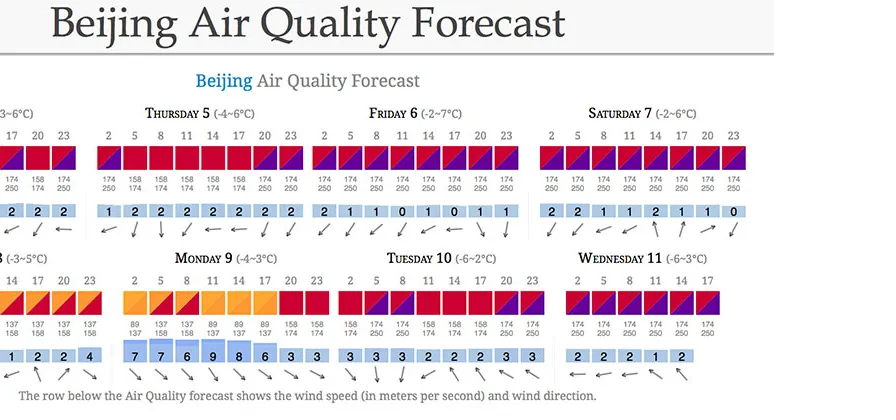Smog gives you cancer and asthma, yes. But why can’t we be more specific?
Beijing is currently bogged down in thick, gray smog which blew into town a few days ago after a brief respite of just one morning, and is due to stick around for a few days. Naturally, in a stinky miasma such as this, thoughts turn to what exactly the smog is doing to your health.
First up: the World Health Organization has defined air pollution as the leading environmental cause of cancer deaths. We know it’s bad. But when we come down to nitty gritty specifics of what the smog will do to you, things get very complicated.
There have been efforts to quantify this in the past, but nobody has been able to definitively say what exactly the smog is doing to your lungs and body except in broad terms that it’s a contributor to various health problems such as cancer and asthma, and it best be avoided when possible. But today we’re going to look at why it’s generally spoken about in such broad terms.
TWOC has reported on comparisons to cigarettes, made by a Beijing doctor, which are handy for getting a general idea of the quantity of PM 2.5 that goes into your lungs, but that’s only part of the story. Cigarettes aren’t smog, even though they’re both bad for your health.
- Smog isn’t all the same
Let’s say you’re a scientist who wants to figure out what smog is doing to human bodies. The first step would be to identify what you’re talking about when you say what “smog” is. Some enterprising scientists recently attempted to do just that by scraping residue off face-masks after 10 days exposure to smog in Northern China. Calcium carbonate, iron oxide and sulphates were found on the masks, so there’s a start. But keep in mind that these substances will vary according to what industries are around. Simply put, what comes out of a car exhaust will be different to what comes out of a quarry. Coal plants will create different smog to steelworks. They will have many similarities, but concentrations and specific substances will vary. Regions all have different amount of smog and different environmental and weather factors that affect this as well. Not to mention different lifestyles. Is a cyclist better off because of more exercise and better health, or worse off due to the increased probability of smog exposure? That’s probably an impossible question to answer because of all the factors at play.
- The size of the particles varies
We’ve known for a while now that it’s the PM 2.5 (or smaller) particulate matter that really gets you. PM 10 particles are bigger, but this means they can’t slide past the lung’s defenses, hence the PM 2.5 counter being the key yardstick for pollution readings. But those PM 10 particles are still key components of a lot of smog.
- People are all different and you can’t just expose them to smog
Some people who are exposed to it for extended periods will get lung cancer, and some won’t. The effects of smog generally take time to sink in. So while it’s well known that young children and the elderly are much more susceptible to ill-effects from smog, imagine trying to actually test what happens to humans exposed to smog. That would require tests in controlled conditions, and that would require human guinea pigs. When former CCTV reporter Chai Jing put together her documentary “Under the Dome,” she offered to be a guinea pig herself. But scientists had to refuse out of ethical considerations, because even though the smoggy conditions were worse outside, scientists, for obvious reasons, can’t be allowed to subject people to things they know are harmful. Not even for the sake of science.
- Health effects take time to manifest
Quick question: how long does it take to get cancer?
Ok, that was a trick question. It varies, and nobody can conclusively give you an answer to that. For smokers, lung cancer might get you from the first cigarette or number 10,000, or might be caused by genetic factors or something else entirely. So imagine trying to study health effects caused by prolonged exposure to smog. It can be done, but it’s difficult and needs lots of caveats.
- Smokers get it worse
Of course they do, but this is one area where we have more concrete data. The World Health Organization has published studies that indicate that when smog and smoking get together, the effects become obvious far more quickly than either one of those two things alone. And with China having a very large number of smokers, that’s a big deal.
- Media make mistakes
There are a lot of issues with science reporting—take this alarmist Daily Mail heading: “Breathing in Beijing’s air is the equivalent to smoking FORTY cigarettes a day”. That is just plain wrong—everyone is different, with varying levels of exposure. The economist got sucked into it as well. If you take anything away from this article, it is that this kind of thing is really difficult to figure out. For a rebuttal of why that figure was wrong, take a look at this article.
- Studies are still needed
The public awareness of smog in China is a positive thing, and will no doubt help create pressure for change. But it’s relatively new. Smog may have been around for a while, but it will take years to conduct multiple studies and build up as much research and opportunities for peer review as we might like. Yes, there has been smog in the past and there is other research to start with. But the scale of the current smog problem in China and India, and advances in modern science, mean it can be researched to a greater extent. That will take time though.
- Studies have to be broad
So what are we left with? Basically, a lot of correlation rather than direct links. Lung cancer rates have skyrocketed in China, as has the amount of smog. There has been a particularly pronounced increase in areas with coal plants, and who really thinks that is a coincidence? There are plenty of studies that show that various substances found in smog are harmful to health, and the nature of small PM 2.5 particles mean they are able to get right up in the soft tissue of your lungs and wreak havoc. To die-hard skeptics, this may not be enough evidence, but then again, they’re free to go wandering around sucking in the smog if they really want to. As for the rest of us, we here at TWOC would suggest you get yourself a good air filter for your home (make sure it’s got a reasonably powerful fan to really suck the air through the HEPA filter, not a timid thing that doesn’t spread the purified air around) and a mask for when you’re out and about.
- Read the WHO background on air pollution.
This isn’t really a reason for the difficulty of studying smog health effects, but we’ll include it anyway: The World Health Organisation is basically the last word on health and they have lots of resources on the health effects of smog. Read it. Start here.
Cover image taken from aqicn.org












